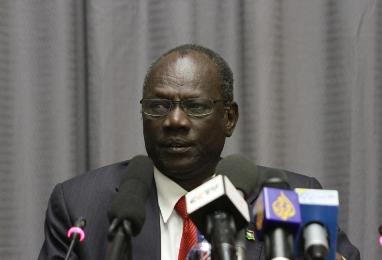South Sudan accuses rebels of reneging on ceasefire matrix
August 28, 2014 (JUBA) – South Sudan government said that rebels withdrew signature from the matrix for cessation of hostilities agreement signed early this week in a move that will hinder delivery of humanitarian assistance .

“This matrix is the only way to operationalise the cessation of hostilities [agreement] and without it, definitely we will not even be in a position to open up the humanitarian corridors […] to render humanitarian services to our people who are badly in need of these services,” said Makuei.
“They (rebels) have withdrawn their signature from that document and as such there is no cessation of hostilities,” he added.
However, rebel leader’s spokesperson, James Gatdet Dak, dismissed the government’s claim as misleading.
“The information coming from the government is misleading. What we signed was a rededication to the existing cessation of hostilities agreement which the two parties signed since 23 January and recommitted to on 9 May,” Dak told Sudan Tribune.
He accused the government of not implementing the cessation of hostilities agreement by withdrawing foreign troops as stipulated in the document, saying the SPLM in Opposition would not sign the matrix without implementation of the clause.
“On our part we want the government to withdraw Ugandan troops and Sudanese rebel groups before we would sign a matrix on ceasefire. This is clear to the mediators and should have been clear to the regime in Juba,” he added.
The two warring parties have been accusing each other of violating the agreement on cessation of hostilities for the past eight months of the conflict.
The agreement called for withdrawal of all foreign forces from South Sudan, but the government refused to withdraw the Ugandan troops until an alternative regional force take charge.
Ugandan forces were deployed days after the conflict erupted in mid-December. They successfully stopped the rebel forces that captured Jonglei state’s capital Bor and were advancing toward the national capital, Juba.
Intergovernmental Authority on Development (IGAD) mediating the South Sudanese warring parties postponed the negotiation to mid-September to give time for more consultations.
(ST)
